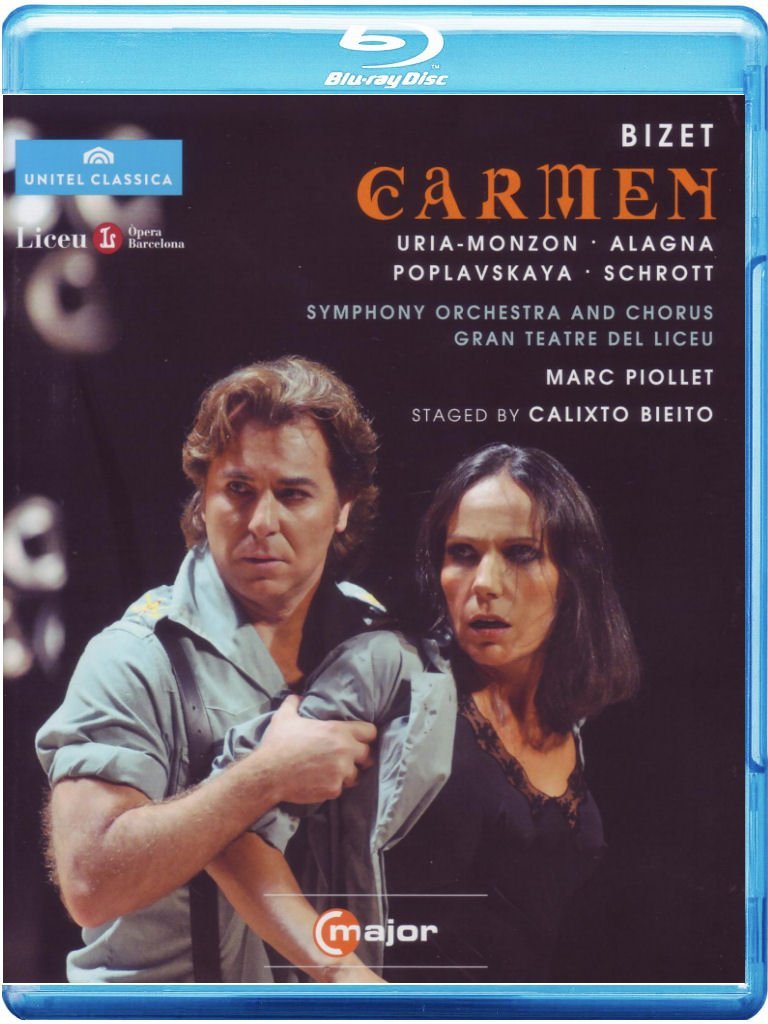

Bizet Carmen opera to libretto by Henri Meilhac and Ludovic Halévy. Directed 2010 by Calixto Bieito at the Gran Teatre del Liceu. Stars Béatrice Uria-Monzon (Carmen), Roberto Algana (Don José), Marina Poplavskaya (Micaëla), Erwin Schrott (Escamillo), Eliana Bayón (Frasquita), Itxaro Mentxaka (Mercédès), Marc Canturri (Le Dancaïre), Francisco Vas (Le Remendado), Àlex Sanmartí (Moralès, a Sergeant), Josep Ribot (Zungia, the Lieutenant), Abdel Aziz El Mountassir (Lillas Pastia), Xavi Estrada (mute/nude Toréador), and Tamara Santiago (Macarena). Marc Piollet conducts the Symphony Orchestra and Chorus of the Gran Teatre del Liceu (Chorus Master José Luis Basso) and the Cor Vivaldi - Petits Cantors de Catalunya (Chorus Master Òscar Boada). Set design by Alfons Flores; costume design by Mercè Paloma; lighting design by Xavi Clot. Directed for TV Pietro d'Agostino. Produced by Gemma Felius and Barbara Berini. Sung in French. Released 2011, disc has 5.1 dts-HD Master Audio sound. Grade: B+
This smart, titillating, probing, and sardonic updating got good reviews from critics. If you are tired of traditional productions of Carmen, you will probably like this alternate reading, which focuses not on a man's murder of one woman, but on the abuse by men of all women. Wild-man director Calixto Bieito restrains himself; everything he puts on the stage actually makes sense is support of his abuse thesis.
I'm not going to try to tell the Carmen story here---for a synopsis in pictures and words, see our story on the Royal Opera House Carmen with Antonacci and Kaufmann. But below are some screenshots of the main stars and some of the unusual mise-en-scène touches from Bieito and his team.
Marina Poplavskaya is a somewhat saucy Micaëla contending here with Alex Sanmartí as Sergeant Moralès. The stage looks more like a parade ground at an army post than a city square:
All the street children are girls who beg food from the mess wagon. The little girls aren't too afraid of the soldiers, who have plenty of factory girls to chase around:
Here the soldiers and factory girls admire the audacious Carmen (Béatrice Uria-Monzon):
Micaëla finds Don José (Roberto Algana). The sound is extremely realistic with excellent balance between the singers and the orchestra. The French diction is especially good---I have the feeling I'm hearing exactly how the words sound in French even if I don't know the meaning of them. The singers are also all strong actors who know how to depict real life. It's heart-rendering to feel the huge suppressed passion that good-girl Micaëla has for her Don José and Don José's anguish at not being able to love Micaëla back:
The seduction scene with Lieutenant Zuniga (Josep Ribot) looking on:
Now Don José is in the stockade, Carmen is bored, and we see a bit of Gypsy life. Bieito creates a completely new character, Macarena, played by Tamara Santiago. Macarena learns tricks from Mercédès and teaches them to her doll:
The man in the white hat is Lillas Pastia (Abdel Aziz El Mountassir). He got evicted from his inn (I take it) and now operates his enterprises from a fleet of cars. He's good at mixing business with pleasure. From left to right we see Macarena, Mercédès (Itxaro Mentxaka), Lillas, Carmen, the Lieutenant on the ground, Frasquita (Eliana Bayón), and Sergeant Moralès at a Christmas office party:
Carmen is doing a striptease:
But her dance is interrupted by the torero Escamillo (Erwin Schrott), who is out drumming up interest in his next bullfight:
When Don José gets out of the stockade, Carmen is ready to have sex. But they hear the bugle playing taps and Don José has to get to bed on time:
Don José becomes a smuggler living with Carmen and the Gypsies in the mountains. The Gypsy scouts see a check point set up by the customs police. Mercédès dresses Macarena in fishnet stockings. The little apprentice is going on her first job with the big girls: they will distract the customs officers. Then the Gypsy men can pursue their practice of just-on-time supply chain management:
Prophetic words from Don José:
Bieito doesn't have a bullfight parade---that cost a lot of money for costumes, props, acrobats, etc. But we do see the chorus acting as spectators to the parade. Time has passed and the county is more prosperous. Now women are being exploited in more sophisticated ways by advertising departments for consumer products:
And the scruffy urchins who begged for food found work in offices and take a shower every day. Now they want to trade their souls for autographs:
Frasquita and Merédès warn Carmen that Don José is lurking in the crowd:
But she's not going to hide:
Acting is job one here, but the singing is also great. Even though the usual local color is drained out, the production is never boring. Most HDVD opera fans will probably want a traditional Carmen as first choice; let them buy this Bieito version as their second Carmen. But younger fans or anyone trying to learn French might well get the Bieito as first choice. I'll give this a "B+."
Here's a short clip with the two leads:
OR




















